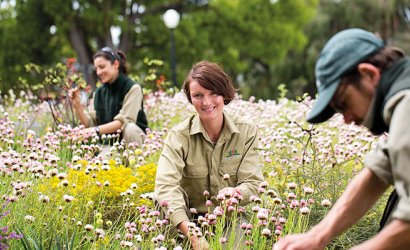

Why choose this course?
Further your passion for a career in horticulture with this qualification. Learn the vital business skills needed to manage large projects including preparing estimates, quotes and tenders, selecting plants and landscape solutions, managing plant health programs, developing production plans and managing staff and services.
During this course you will also gain the skills and knowledge required to design, plan, implement, manage and evaluate horticultural operations and processes and how to effectively manage and maintain public and private parks, reserves, gardens, natural bushland and community recreation areas.
Employment prospects exist in local government, state government, nursery and turf, floriculture, gardening and the landscape industry
Career opportunities
- Horticulturist
- Landscape Gardener
- Plant Nursery Manager
-
An IELTS score (academic) of 6.0 with no band score less than 5.0 or equivalent.
-
Completion of AHC40416 Certificate IV in Horticulture is required for entry into this course.
Please refer to the Non-Tuition Fees section of your Letter of Offer for any additional requirements where a cost may be incurred.
There may be further semester intakes available for enrolment. You can view any further intakes when you submit your online application(opens in a new tab).
For information about pathways from TAFE to university, view our Pathways to university page.
How to apply
Apply to study at TAFE in six steps:
- find a course;
- check entry requirements;
- submit an application;
- accept your offer and pay;
- apply for your student visa; and
- receive your visa and come to Australia for your studies.
Build your own course guide
Select the study areas, courses and topics you like. Get your custom guide by email!
Download study area guide(opens in a new tab)
Contact us(opens in a new tab)
TAFE International Western Australia (TIWA) is the Registered Training Organisation (RTO) and Commonwealth Register of Institutions and Courses for Overseas Students (CRICOS) provider, for the delivery of training to international students, enrolled in a TAFE course in Western Australia. This nationally recognised course is delivered by a Western Australian TAFE college on TIWA's behalf. TIWA retains responsibility for the quality of the training and assessment delivered by the TAFE colleges and for the issue of certification documentation to students.

